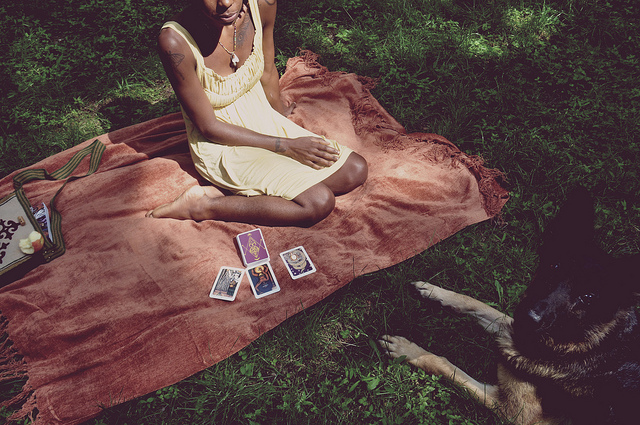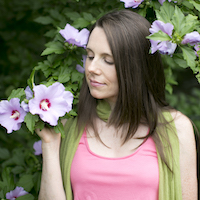
I spent years cramming my brain with facts and quotes and timelines.
At the time, I felt stressed, anxious, and resentful of the long hours spent cramming for exams. Now I see that there was a glimmer of truth in my stress and resentment as it whispered, “Sarah, you’re wasting your time—go play.”
When I graduated with my Bachelor’s degree, I forgot it all.
The facts melted away in the burning embers of the present, as I laughed with friends running through green, grassy parks. My study notes evaporated in gusts of wind as I hiked up hills and learned to appreciate the pure air the trees provide us. My crammed-to-the-brim brain cells began to melt open each time I gazed up at the sky I was too busy to notice for the 16 years of my academic life.
During those post-grad years of play and inner exploration, I took up yoga and began to appreciate the great outdoors; but I didn’t forget some things.
One of my favorite philosophers stayed with me. His words whispered to me in moments when I forgot all of that knowledge and just appreciated what was in and around me. There was something soulful about his wisdom. Henry David Thoreau’s thoughts, unlike some other “great” thinkers, were different.
Thoreau’s thoughts seemed alive and palpable to me. Each time I read his work, it was as if it watered the seed of aliveness in my body, awakening the thoughts and feelings of my soul, merging my human self with the “otherworldly” me.
Thoreau’s thought: “It is only when we forget all our learning that we really begin to know,” reverberated truth to me with each breath I was fully present for, and with each sunset I took the time to enjoy. That thought massaged out the conditioning that years of school had branded into my overly-anxious self.
As years passed, I felt okay knowing I remembered what I needed to remember from my academic years. What I remembered was the stuff that I didn’t need to study: the Thoreau philosophies, the Emily Dickinson and Shakespearean depths, but also how to balance a check book, and leave a proper tip.
What I remembered was the stuff the embodied soul living in a human body is made of; the intuitive knowledge that doesn’t need an index card to be birthed into this life.
When I forgot, I started to appreciate this life and really live it.
I was the good student, the teacher-pleaser, the unnecessarily hard worker, the brown-noser. You pick a name and I was it. I was seeking something in the classroom I wasn’t getting at home: acknowledgement and recognition. When I dropped that role—or really, when that role dropped me—I began to really live my life.
How did I morph into a new role? Somehow, the day I got my undergraduate diploma in the mail (because I chose not to walk across the stage), something deep within me burned that vision of my cap and gown. I gracefully recycled most of my college notebooks—except for my English class notes, that I cherished and savored—and in the process, recycled my teacher-pleasing, A-plus seeking self into a “f*ck the grades and let’s water those seeds” self Thoreau reminded me was there all along.
One of my favorite cards in the Tarot deck is The Fool.
I used to hate it when I sat down to pick a random card from the Tarot and got The Fool. I hated it because I didn’t understand he/she is the wisest soul in the deck. The Fool embodies the thoughtless, in-the-moment innocence, faith in the universe, playfulness of a toddler, infused with the soul-embedded wisdom of a village sage. The Fool thinks with his/her heart and acts with the thoughtless intuitiveness of the soul.
The caveat with The Fool is that you can sometimes be pegged as a fool and judged as thoughtless or careless in your spontaneous way of living. I had many fool moments in my 20s. I gave way to my intuition and sometimes walked with my head held high into traps where I was hurt and wounded, and, perhaps, unintentionally hurting or wounding others.
Many of my “fool moments” were connected to relationships that I regretted after the fact, but now can look back on with the all-seeing eye Thoreau spoke of, and feel gratitude for an experience that made me the strong, open-hearted, and risk-taking human being I am today.
Somehow, the childish wisdom of The Fool makes me more appreciative of each and every experience I thoughtlessly, blindly, but mindfully walk into. For while The Fool can be deemed thoughtless, it is not mindless. The Fool, like the small child and the village sage, is very present in the moment. The Fool feels what is happening deeply and thus embodies a light-filled energy of play and enjoyment, truly living Shakespeare’s words: All of life’s a stage, and we are but actors upon it.
Today, I’m back in the academic world, finishing up a Master’s degree in Counseling with the wisdom of Thoreau gracing my journey. I no longer cram; I study to understand. And, because this is my chosen profession, I am deeply at home with the material in a way that feels closer to knowing than it does to learning.
The years I spent reading self-improvement books to learn new ways of engaging with myself and with others, now somehow feel empty and disconnected. That place of knowing, is way, way beyond the intellectual mind. That place of knowing lies deep in the chambers of the emotional heart; that is the closest place in the body to access the embodiment of what we call soul.
Today, I appreciate forgetting as an art.
I still catch myself in moments of wanting to learn and please others and appear a certain way to the world, even to myself. If my soul wakes up in those moments, it beckons me to take a deep breath and go inward to that all-knowing, all-seeing place.
From that place, I can open my inner eye and look around. Suddenly, my environment becomes more vibrant, my emotions and thoughts become more ephemeral, and thus more enjoyable. From that place, I begin to appreciate, and to say thank you.
And the more I say thank you, the less I feel I have to learn. The more I say thank you, the more I feel in the know about this thing we call life.
~
Author: Sarah Theresa
Image: Monique Prater/Flickr
Editor: Lieselle Davidson
Copy Editor: Callie Rushton










Read 0 comments and reply